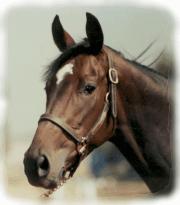A Horse, of Course with Don Blazer |
If you enjoy learning about horses, then you'll love our online courses. Each month you'll find a new column on our web site. We hope you'll enjoy it, and maybe e-mail us with questions or suggestions for other columns. A Horse, Of Course is a monthly column syndicated by Success Is Easy. If you like the column, call your local newspaper, or local horse publication and ask them to subscribe by contacting Success Is Easy. |
Horses = Manure Don Blazer copyright©2011 We pick up our paddocks twice a day, every day. Gives me plenty of time to think. One of the things I keep thinking is: why am I doing this? Several answers come to mind. First, it gives me time to think. Second, since I'm not training any more, I don't have a staff. Third, someone has to do it, so I might as well be out in the fresh air getting a little exercise. I started my horse career mucking stalls and picking up paddocks and it looks like I'm going to finish mucking stalls and picking up paddocks. In between there have been horses bought, horses sold, horses bred and horses foaled. There have been championship buckles and on occasion "white knuckles". I've seen the winner's circle with stakes horses and been last across the finish line with the cheapest of claimers. I've written some books and taught some classes; had some accomplishments noted and been misquoted. Yesterday, as I picked up the paddocks I got to thinking, "I've seen a lot of horse manure in my life." How much? In a 12-hour period, each of our horses will leave 7 to 9 piles of manure to pick up….that's 14 to 18 piles per horse per day. If the average 1,000 pound horse eats 25 to 30 pounds of feed per day, then deposits 50 pounds of manure each day (much of the weight is moisture and body tissue waste) you are going to see a lot of manure. Just so you'll know the average horse also produces 2.5 gallons of urine per day. When I'm picking up paddocks or mucking stalls I use a four-wheeler that pulls a spreader, and I just fling the stuff into the spreader. That's the modern way. I originally learn to muck stalls using a "muck sack." A muck sack is 8 gunny sacks (feed came in gunny sacks) split open, laid flat, then sewn together with twine to make a large surface upon which to toss horse manure and stall bedding. The muck sack was laid out in front of the stall. When you got a big pile of manure and bedding on the gunny sack, but still thought you could pull it, you grabbed two ends and dragged the sack over to the "muck pile". At the muck pile you dropped the ends of the muck sack and went to the opposite end. Now all you had to do was get the two opposite ends of the muck sack and pull them up and over the muck pile. Bedding in those days was always straw. The soiled bedding and horse manure was picked up and hauled off in large trucks to the mushroom growers. Stall cleaning in those days was done by a "guinea." The term "guinea" referred to a groom who usually looked after four horses. A guinea was an English gold coin, (last minted in 1813 and was equal to 21 shillings) and was the amount a groom received for a month's work; hence, a guinea. The last time I heard the term guinea used was in the early 1960s. Stall cleaning was done while the guinea's horse was being "worked". When the horse came back to the barn from his training gallop, he was handed off to the guinea who then gave the horse a bath. Once bathed, the horse was handed off to the "hot walker." A hot walker at that time was not a machine, but a guy who led the horse around the "tow ring," stopping every few laps to allow the horse to drink at a bucket of water placed at each end of the tow ring. Tow rings were not round, but elongated ovals naturally "worn" in the area between shed rows. (Shed rows refer to the long line of stalls or barns on the backside of a race track.) Hot walkers were usually guys who did not want the work of a groom, but instead were looking for a quick $2 to bet on the first race. Hot walkers would usually "cool out" (walk) several horses in a morning. Walking a horse could take up to 45 minutes. Once the wheel was invented, of course we started to use wheelbarrows, and everything changed. But now I'm thinking, the more things change the more they stay the same. And I'm still mucking stalls and picking up paddocks. |
